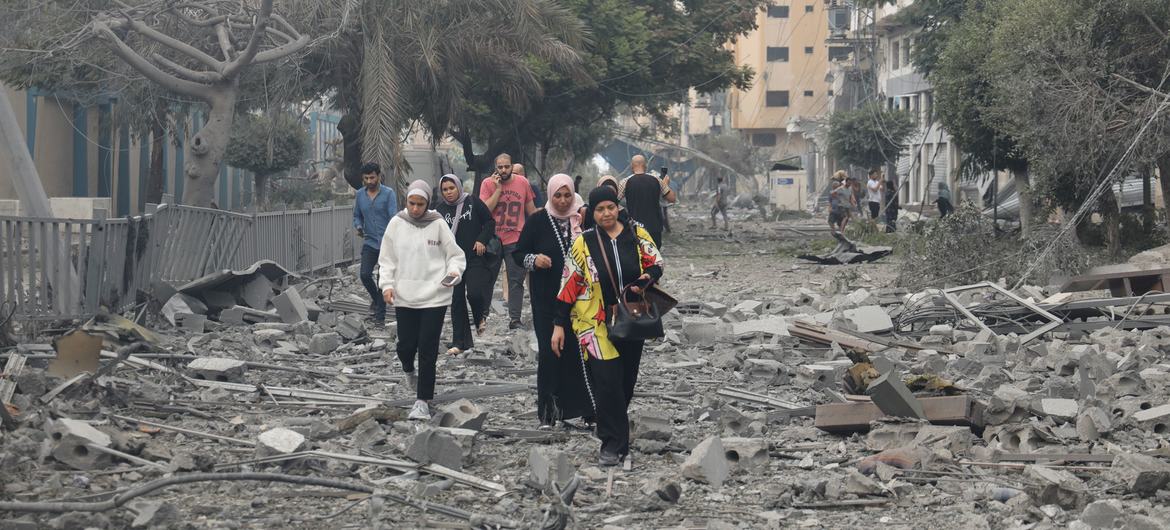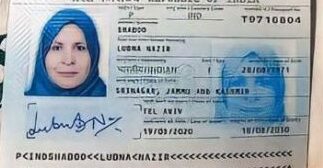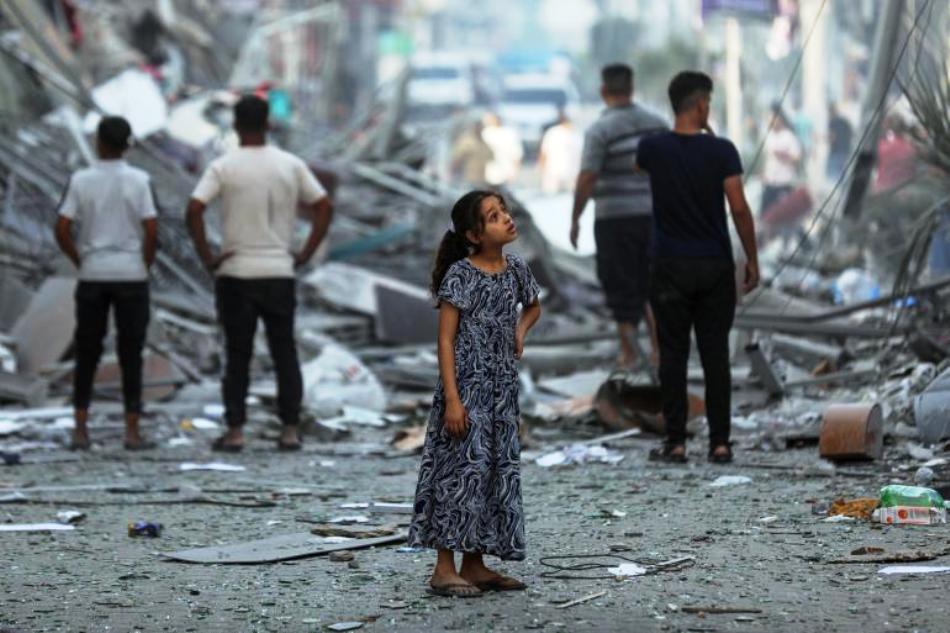A Kashmiri women settled in Gaza has been waiting for an evacuation since October 7. Babra Wani communicated with her to get an idea of the situation that United Nations in a detailed feature termed grim

Amid the relentless bombardment on the war-torn Gaza Strip, a region engulfed in turmoil for the past seven decades, people are desperately seeking safety for themselves and their families or even a means of evacuation. One among these distressed individuals is Lubna, a 52-year-old woman who has resided in Gaza since 1997.
In Gaza
Lubna, like many others, is profoundly concerned about the safety and well-being of her family, which includes her husband, Nedal Toman, and her three children. Her two daughters and son, with the youngest, Fatima and Omar, are currently pursuing their studies at Cairo University in Egypt. She expressed her worries, stating, “Though my children are grown now, the situation has deteriorated significantly since I arrived in 1997.”
Originally from Srinagar in Jammu and Kashmir, Lubna Nazir Wani now finds herself stranded in this volatile region with her husband and eldest daughter, Karima, who is a medical professional. Despite spending over two decades in Gaza, this year marks the first time Lubna and her family have sought evacuation.
“This is unlike anything we have experienced before,” she described the gravity of the situation. “The internet is incredibly unreliable, connecting for mere minutes.” She shared via text message before losing connection.
Lubna and Nedal’s story traces its roots back to Aligarh Muslim University (AMU) in Uttar Pradesh. They met in 1992, with Nedal studying engineering and Lubna pursuing her Master’s degree in Biochemistry. Despite initial reservations from Lubna’s family about her marrying a Palestinian and residing in Gaza, they eventually decided to honour her wishes. The couple tied the knot after Lubna completed her degree, celebrating their union in Kashmir before moving to Gaza in 1997.
Humanitarian Crisis
“The situation has always been challenging, with numerous past attacks, but this time it is different,” Lubna’s message reads. Amid ongoing tensions, aerial bombardments, and a warlike environment, Lubna’s family, like hundreds of others, was instructed to evacuate their northern Gaza residences and seek refuge in the south.
However, the southern region has also suffered relentless bombings, as Lubna reported, “In the south, casualties are mounting, homes, hospitals, churches, and mosques are targeted. Children are losing their lives everywhere.”
Communication within Gaza is nearly impossible. Lubna’s family, like others, relies on sporadic updates from outside sources. Lubna explained her unprecedented plea for evacuation, “I have weathered past attacks and hardships without asking for evacuation. But the situation here is dire, deteriorating day by day. The aid coming in is insufficient for Gaza’s population.”
According to Lubna, around 2.1 million people in Gaza are living under the constant threat of bombardment. She dispelled a false news item regarding her evacuation to Egypt. “I am still pleading for evacuation. Aerial bombardment of homes with people inside is commonplace; no one is safe,” she wrote.
Perilous Existence
Lubna underscored the daily risks faced by her family in Gaza: “It is incredibly dangerous here now.” After evacuating their northern Gaza home, Lubna and her family are currently staying with her sister-in-law near the Egyptian border, known as Rafah. However, authorities have not opened it, leaving many foreigners like Lubna stranded. They eagerly await any assistance from their embassy to evacuate to Cairo. Tragically, the family has already lost relatives in their husband’s extended family. “We have lost women and children.”

Lubna’s family, including her mother and younger brother residing in an uptown Srinagar locality in Srinagar, are anxiously awaiting news about their daughter’s safety. They are currently left with nothing but prayers and hope for the safe evacuation of Lubna, her daughter, and her husband. Lubna’s final text message to the reporter poignantly reads, “I wish I could write more.”
Israeli authorities have cut off essential supplies, including food, fuel, electricity, medicines, and exit points in the Gaza region since earlier this month, exacerbating the already dire humanitarian crisis.
Global Response
Even though the United Nations and the Muslim World are reporting non-stop diplomacy, Tel Aviv has not stopped bombardment of the region. American newspapers quoted Gaza health officials saying so far 6747 Palestinians; including 2913 minors have been killed. Nearly 1400 people are reported killed in the Hamas attack on October 7, an infiltration that triggered the serious crisis, which could engulf the entire Middle East.
The United Nations Security Council met twice and discusses the resolutions aimed at ceasing the Israel operations. The initial resolution was vetoed by the USA and the second by other veto-carrying powers including China. They are unable to have a consensus on the terminology of the resolution. Interestingly, the speech made by the UN Chief triggered another crisis as Israel prevented issuing visa to top UN officials from getting into the area.
Now, for the last two days, the UN General Assembly is in an emergency session – an attempt to manage the passage of a Jordanian-backed draft resolution, which among others calls for an “immediate, durable and sustained humanitarian truce”, all parties comply with international law, and continuous and unhindered aid into the Gaza Strip. The siege has prevented any humanitarian aid into the strip barring a limited supply of bottled water and medicines.
The crisis could trigger a longer regional conflict. While the US has moved its ships to the area, China and other powers are also following the suit. Iran is threatening on daily basis to get in and Lebanon based Hezbullah has thrown its hat in the ring already. Egypt is under pressure from its people to get involved and it has moved its troops near the Palestine border for apparent symbolic reasons.
The UN News
A UN News feature said Volker Türk, the head of the UN agency for Palestine refugees (UNRWA), has said that the “few (aid) trucks” which have come in from Egypt since 21 October are “nothing more than crumbs that will not make a difference for two million people”.

Amal, 7, contemplating her neighbourhood after neighbouring homes were levelled to the ground.
“What is needed is meaningful and uninterrupted aid flow. To succeed we need a humanitarian ceasefire to ensure this aid reaches those in need,” he insisted.
UN human rights office (OHCHR) Spokesperson Ravina Shamdasani told journalists in Geneva about the “harrowing testimonies” of parents writing children’s names on their arms to be able to identify their remains.
Staff on the ground tell her that each night they make calculations on whether to sleep in the open or indoors, weighing the risks of being killed by a falling ceiling or shrapnel.
UN World Food Programme (WFP) Representative in Palestine Samer Abdeljaber said that people in Gaza described the situation as a “nightmare – and we have no way to wake up from it”. He highlighted the dire conditions in UNRWA-designated shelters which are almost three times over capacity.
“In the room the size of a classroom 70 people sleep, eat, drink and take care of their families”, he said, and there are eight toilets for 25,000 people.
Speaking from Jerusalem, the UN’s top humanitarian official in the Occupied Palestinian Territory, Lynn Hastings, stressed that “all humanitarian assistance and humanitarian issues have to be unconditional”.
The 224 hostages held in Gaza need to be released “immediately and unconditionally”, she said, reiterating calls from the UN chief António Guterres. Humanitarian aid also has to be able to reach people in Gaza “unconditionally”, she said.
Ms Hastings highlighted the “terrible choices” which the aid community is confronted with, given the very small trickle of aid that has been coming in, the fuel shortage and the security situation.
She deplored the need for humanitarians to decide “which communities do you send the items to, which bakeries, which desalination plant should be turned on or off, which hospital do you send medication to”.
Hastings said that in normal times more than 780 trucks with fuel would have crossed into Gaza since 7 October. In the absence of deliveries UNRWA has been relying on a sole fuel pump situated close to the Rafah border but access has been “sporadic” and supplies were dwindling very fast.
Forced to ration fuel, bakeries in the Strip will only be able to bake bread for a million people for another 11 days, Ms Hastings warned, while UNRWA warned that some are already going hungry.
WFP’s Samer Abdeljaber said that only two WFP-contracted bakeries are working, compared to 23 at the start of the operation.
Fuel is also critical for to power water desalination plants so that they can produce drinking water, and pumping stations.
Ms Hastings flagged that with sanitation backed up, raw sewage is being pumped into the sea in Gaza but once fuel runs out, “whether it’s tomorrow or Monday”, sewage pumping will become impossible and wastewater will be “overflowing in the streets”.
Dr Richard Peeperkorn, UN health agency (WHO) representative in the occupied Palestinian territory told journalists that a minimum of 94,000 litres of fuel per day are needed to “keep critical functions running” at 12 major hospitals in Gaza.
Two in three hospitals in the enclave are “partially functional” Dr Peeperkorn said. He underscored that power and medical supplies shortages were putting at risk 1,000 kidney patients in need of dialysis, 130 premature babies in incubators, 2,000 cancer patients and scores of others on ventilators in intensive care units.
A Drop in the Ocean
Humanitarians stressed that the lack of fuel is also compromising the ability of aid trucks entering through the Rafah crossing to distribute the supplies across Gaza.
Ms Hastings underscored the difficulty in getting aid to the north, which is under evacuation orders, but has seen displaced people move back from the south due to airstrikes and “untenable” living conditions there.
She also reiterated that the 74 aid trucks which have been allowed in through Rafah since 21 October, with another eight or so expected today, were very little compared to the 450 trucks entering Gaza daily prior to the crisis – “a drop in the ocean”, according to WHO’s Dr Peeperkorn.
WFP’s Samer Abdeljaber said that his agency has only been able to bring in under two per cent of the food required. WFP has delivered fresh bread and canned tuna to half a million people in shelters in Gaza but “for every person receiving assistance, six more are in need”.
Some 39 WFP trucks are at or near the Egyptian border with Gaza awaiting entry, Mr. Abdeljaber said, and other agencies have also pre-positioned supplies there.
If sustained access and fuel are granted, the agency plans to bring life-saving food to more than one million people within the next two months, he said.














